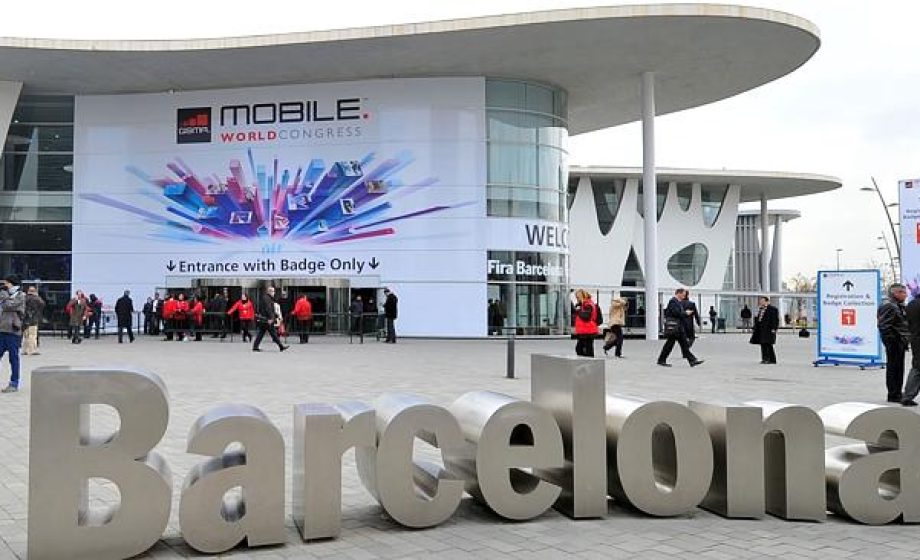
The king of all mobile trade events got underway yesterday in Barcelona. Each year the Mobile World Congress (MWC) seems to get bigger and more unwieldy than the last, but it remains one of the tech world’s can’t miss events. It’s hard to ignore though how major shifts in the mobile ecosystem have fundamentally changed the look and feel of MWC over time. What started as an event for telcos and mobile phone manufactures, has evolved into an event where wearables, connected cars, mobile identity, messaging apps and social have risen to the top of the agenda.
This is a massive event with well more than 60k people attending, 8+ exhibition halls, and numerous conferences and press conferences, so lots of great stories to tell. But here were my highlights from day one:
The future is all about ‘Connected Living’
When you go to the GSMA’s site ‘Connected Living’ are the first words you see. Their Connected Living initiative is actually their an ecosystem development initiative to help operators accelerate the delivery of new connected devices and services. Given that the GSMA works to have its finger on the pulse of the next big thing in mobile, it’s not surprising to see the concept of ‘Connected Living’ everywhere at MWC.
While all the big players have gotten into the game with Samsung leading the way, some of the most interesting innovations in this space continue to come from start-ups, SMEs and other emerging leaders focusing exclusively on this space. While leaders such as Fitbit, Nest and Withings immediately spring to mind (amongst others), there are lots of other great innovators in this space exhibiting at MWC, including Vancouver-based Mio Global the pioneers in wrist worn heart rate monitors, Israel-based Essence delivering connected-living end-to-end health, security and communication solutions, and (also) Israel-based LifeWatch V who’ve developed a smartphone that monitors almost every health metric imaginable.
I’m sure this is just the tip of the iceberg as to what’s out there in the connected hardware and services space. With the announcement of the Rude Baguette’s first Connected Conference on June 18th/19th, we’re obviously bullish about the future of the connected lifestyle. It’s nice to see that the mobile ecosystem agrees.
Samsung outroaring its rivals again
As usual, all the handset manufacturers kicked off MWC with a host of new announcements and product launches, but perhaps the most anxiously awaiting announcements were from Samsung. Over the weekend, Samsung kicked things off with the announcement of two new smartwatches, Gear 2 and Gear 2 Neo. What arguably makes the Gear 2 most interesting is that Samsung has moved away from Android OS used in its original Galaxy Gear devices to its own Tizen OS.
But this announcement wasn’t the one everyone, particularly the media, were anxiously waiting for. The big announcement was the anxiously awaited news that Galaxy 5 will be rolling-out soon. Although there were hopes that Galaxy 5 would focus on incorporating more ground-breaking innovation, Samsung chose to focus on improving features their users found most pertinent, such as better battery life and standby functionality, waterproofing and, interestingly, new fingerprinting functionality.
With WhatsApp at the top of everyone’s mind, Mark Zuckerberg chose to focus his talk on bringing emerging markets online
Most of the room (or rooms given the overflow) was waiting with baited to hear Zuckerberg’s thoughts about and future plans for WhatsApp. Although he touched upon the acquisition stating that WhatsApp was arguably even more valuable than the $19B that they paid for it and that it would continue to operate autonomously, leveraging Facebook’s tools, resources and know-how as necessary to scale, the bulk of his talk was on an initiative near and dear to his and Facebook’s heart, internet.org.
Internet.org is a coalition-based initiative comprising various mobile industry/tech leaders, including Facebook, Nokia, Samsung, Qualcomm, etc. The goal is get the remaining 4.3B people not yet on the internet online. The coalition plans to make this reality by offering access to basic services, such as messaging, basic education and health information and social media as a free gateway to bring more users in emerging markets on-line. Of course working with local mobile operators is imperative to getting this off the ground, but the coalition has already made some strides in countries such as Paraguay and the Philippines. Of course, in the long-run, this benefits Facebook big time and is an attempt to address their retention issues, but it’s still encouraging to see Zuckerberg taking the long rather than the short view. It’s clear though that what’s going to going to ultimately make the initiative a success is bringing the likes of Orange, Telefonica, Vodafone, et al on-board.
France’s Orange, Gemalto and Deezer join GSMA led Mobile Connect initiative
The French Touch was on display today as GSMA’s press conference held jointly with Orange’s Stephane Richard, Gemalto’s Olivier Piou and Deezer’s Axel Dauchez to announce the Mobile Connect initiative. Mobile Connect, which is actually supported by a wide array of industry leaders, is an innovative new service that will allow consumers to securely access a wide array of digital services via their mobile. Although leading mobile operators are spearheading the initiative, leading internet content and services players such as Deezer, Dailymotion, and Gemalto are obviously a key part of delivering a solution. The solution is actually built off of existing technology, the OpenID Connect protocol, which they’re hoping will reach their goal of achieving wide geographical coverage by 2015.
In commenting on the value of the initiative for their users, Deezer CEO Axel Dauchez added:
“This new innovation from the GSMA is set to provide a much simpler experience for Deezer users, which means more people can focus on what’s important to them – discovering great new music. With around 65% of all music listened to on Deezer via mobile phone, Mobile Connect will help provide music fans with a seamless mobile experience as well as increased convenience across other devices”

